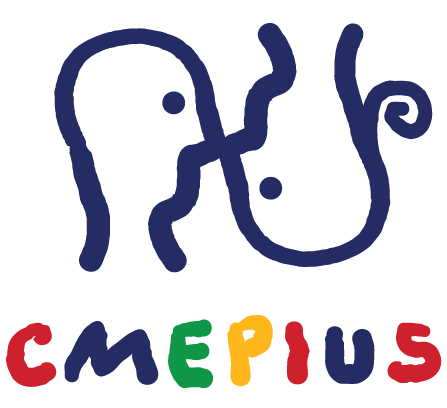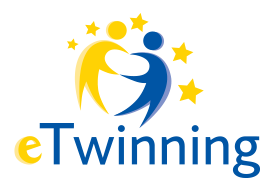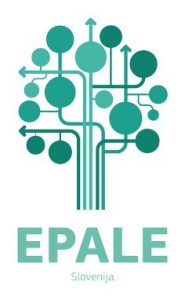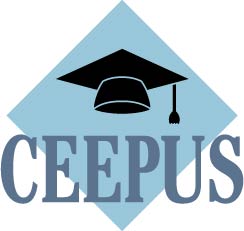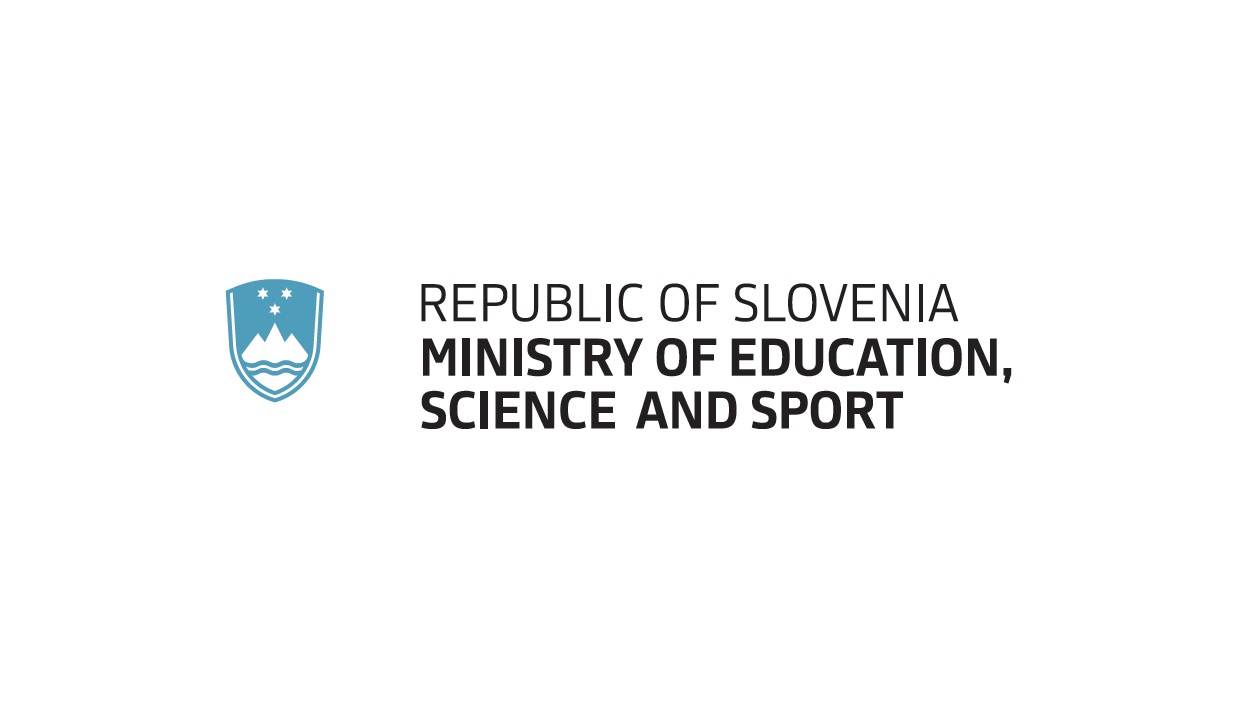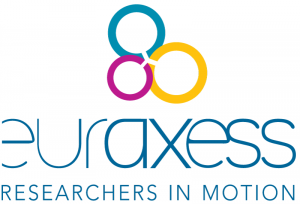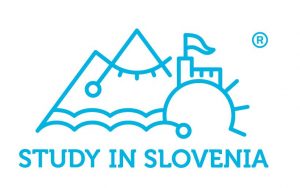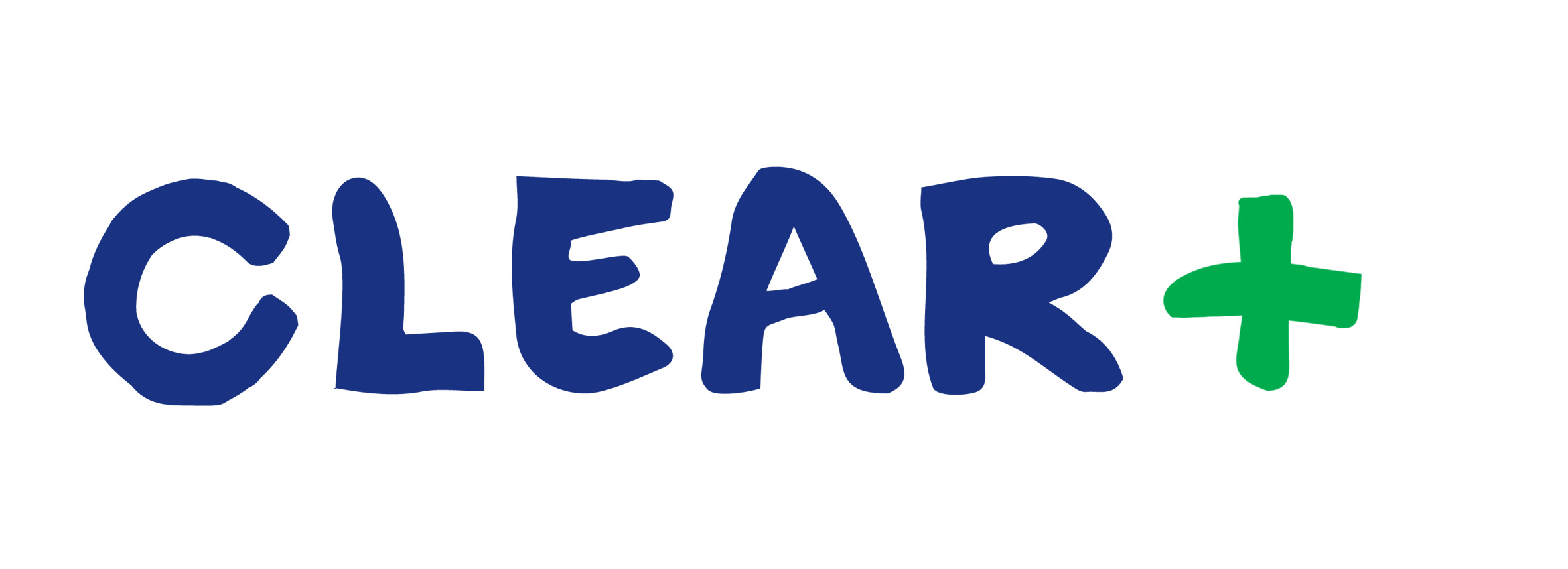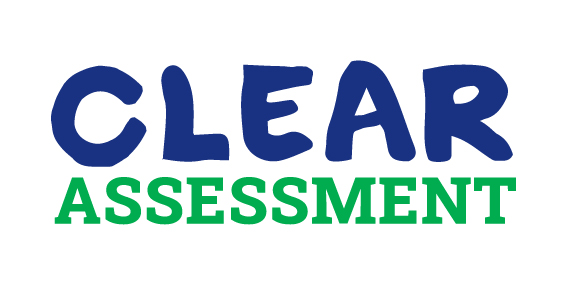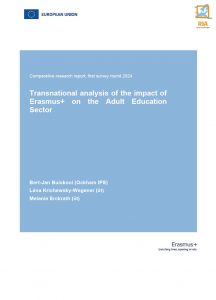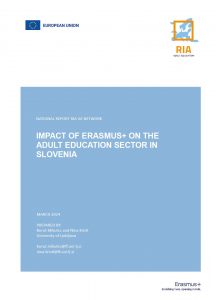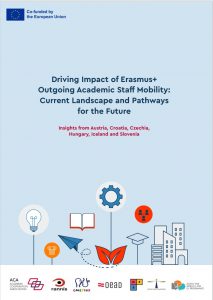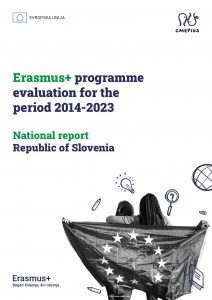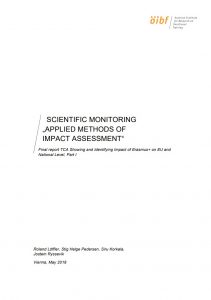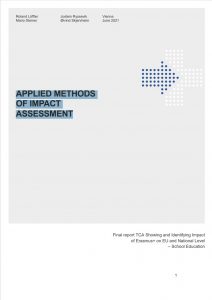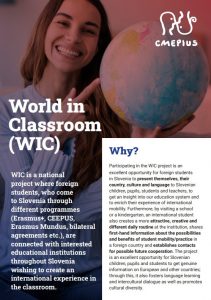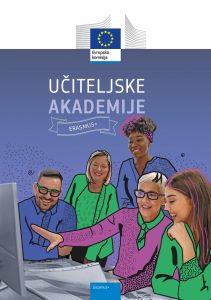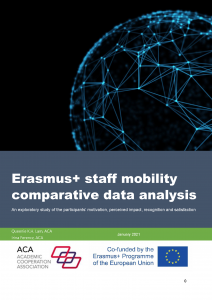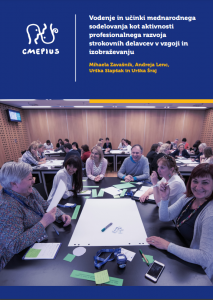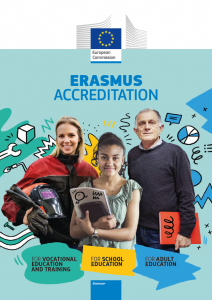About
CMEPIUS
National Agency for European Community Programmes and International Mobility Programmes
CMEPIUS
Activities
Projects and support activities
CMEPIUS
Library
Publications, manuals and professional articles
About us
We are a public institution that has been growing over the years and at the same time remaining a friendly organisation—both externally towards our users and partners and internally towards our employees (family friendly organisation).
We are an institution that speaks in both the national and international environment. We want to work and act with quality; we are frequently initiators, often facilitators, coordinators of knowledge, experience and ideas. We are not running out of ideas for proposals for development, progress and growth. We are thinking broadly: the generations that are yet to come, the regions and states with which we do not yet work. We work with the heart because we know that what we do is changing our environment for the better. At the same time, we are learning and getting to know our strengths and potentials for further development. That is why we can always get better. Above all, we like to share knowledge, listen and share. We believe in the common objectives of education, both at the national and European level, and we are working towards achieving them. Our mission and vision are clear. We are proactive. Learning is a process that lasts a lifetime.
CMEPIUS carries out the public service activities set out in the Establishment decision.
Regular activity
National Agency for European Community Programmes and International Mobility Programmes:
- Erasmus+ (successor to Erasmus+ (2014-2020) and Lifelong learning programmes),
- scholarships (CEEPUS, bilateral, Osimo, Slovenian language courses).
Projects and support activities
- eTwinning programme,
- EPALE platform,
- EURAXESS (information support for researcher mobility in Europe),
- Study in Slovenia,
- European language label,
- event organisation,
- programme evaluations,
- recognition of quality projects (jabolka kakovosti, zlati kabel).
Our activities
International Mobility
Erasmus+ is a European Union programme, addressing international cooperation in the fields of education, training, youth and sport. The purpose of the Erasmus+ programme is to raise the quality of education and training, thereby strengthening the social cohesion and competitiveness of the Union’s economy. Erasmus+ wants to enable the participation of as many individuals as possible, especially those from environments with fewer opportunities, and highlights the contents and activities of inclusion, environmental protection (green Erasmus) and transition to a digital society.
The programme enables cooperation between institutions that provide education and training, from kindergartens to universities and adult educators. Other organisations (companies, associations, societies, etc.) that are in any way related to the activities of the field can also participate in the projects. Through activities, individuals acquire various personal and professional skills and competencies, complete study obligations or traineeship abroad, expand the network of acquaintances and knowledge of education systems in different states. Organisations also acquire new knowledge, different methods of work that raise the quality of their operations and the ability for international cooperation.
Erasmus+ supports three key actions and Jean Monnet actions:
– under Key Action 1 (KA1), organisations can obtain funding for the mobility of individuals (learners and staff can go for training, traineeship, job shadowing, exchange to a partner organisation in another country).
– under Key Action 2 (KA2), organizations can obtain funding to implement international projects of varying scale.
– under Key Action 3 (KA3), the European Commission provides support for various system-oriented projects.
– Jean Monnet actions continue to contribute to reflections on European integration by fostering knowledge and awareness of EU matters.
Organisationally, the implementation of the Erasmus+ programme is overseen by the European Commission in cooperation with a network of national agencies in all participating countries. Most of the activities under Key Actions 1 and 2 are carried out by national agencies in each participating country, and some of the KA1, KA2 and KA3 activities in the field of education and training are conducted entirely by the European Commission itself through the Executive Agency.
The eTwinning portal is a virtual multilingual community of schools and kindergartens, which enables you to quickly and safely establish international, virtual contacts with Europe. It is designed as:
– a springboard for establishing the first steps in informal project collaborative work at a distance for you and your pupils/preschool children,
– a relevant source of your professional development at home and abroad,
– at the same time, it is your starting point for exchanging ideas, materials and interacting with colleagues from abroad.
The portal offers you support in introducing modern, innovative teaching and learning methods into your classroom and playroom, supported by information and communication technology (ICT). This represents an important enrichment for your classroom and your already established teaching method.
EPALE is the central multilingual online platform for adult education in Europe. It is a community with an open membership that brings together professionals in adult education. The platform is available in 32 languages.
EPALE offers you various opportunities for your professional development, as well as for the development and internationalisation of your institution. It offers a comprehensive insight into current developments in Europe, and at the same time, the platform provides the full basis for policy development—both at the EU and national level. The content is divided into five thematic sets – support for educators, learning environments, competencies, policies and quality, allowing you to search for information in a structured way.
In addition to the Erasmus+ programme, there are additional opportunities for international experience for both students and academic staff. The CEEPUS programme brings together universities of Central and Eastern Europe and facilitates exchanges in selected states participating in it.
In addition to the above-mentioned programme, Slovenia has concluded bilateral agreements with selected countries around the world, through which students can go to certain countries for exchange in order to study or to do their traineeship. These are bilateral scholarships and these also offer interested candidates a mobility experience in another country and culture.
Euraxess is a European initiative aimed at researchers and higher education institutions to promote and facilitate the mobility of researchers and, consequently, their career development.
The key tool is the portal, through which Slovenian higher education institutions publish vacancies and use the tools on the portal to improve their services for researchers.
At the same time, the portal allows researchers to search for jobs, collaborating partners and find all the necessary practical mobility information for another country in one place. Each country has its own portal, but the main one is European.
Study in Slovenia is an initiative in which we cooperate with universities and higher education institutions with the aim of promoting Slovenian tertiary education and Slovenia as a study destination in general, be it through exchange (Erasmus+, CEEPUS, bilateral) or through full-time comprehensive study. The initiative supports the national strategy of internationalisation of higher education and contributes to achieving its objectives through its activities.
Together with our institutions, we perform together with joint messages at higher education fairs abroad and online events aimed at foreign student candidates. The main information tool is the website, which is complemented by Facebook, Instagram and YouTube channel.
Slovenian students, on the other hand, can find information on study and living opportunities in another selected country on the Study in Europe website, with which we are in close cooperation, as each European country has its own website providing all the necessary information to candidates.
Cooperation
Long Term Activities and Accreditation
LTA 2025-2027 CLEAR+
Collaboration on the Levelling-up of Erasmus+ Assessors through developing and testing a common Resource set for KA2 assessment: Programme-level updates, Learning from experience and Use of digital tools and Software.
LTA 2022-2024 CLEAR Assessment
Collaboration on the Levelling-up of Erasmus+ Assessors through developing and testing a common Resource set for KA2 assessment
Accredited slovenian organisations in Erasmus+ programme:
The Library
Publications, manuals and professional articles
In the library you will find publications, manuals and professional articles prepared by the Centre’s staff independently or in cooperation with external experts to support and promote the implementation of EU programmes.
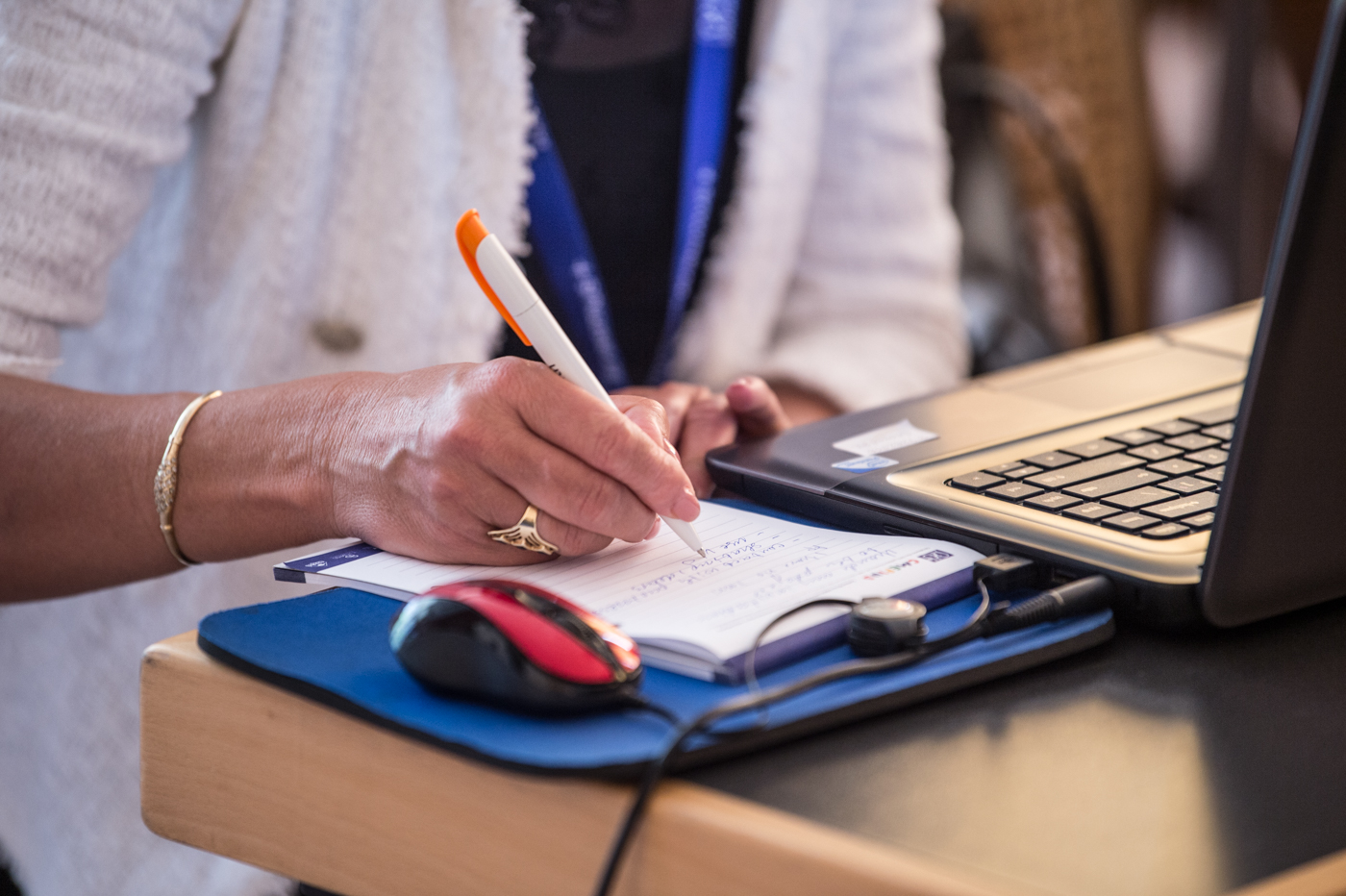
| Cover | Title | Year | Tag | Download | library_hfilter |
|---|---|---|---|---|---|
RIA-AE Transnational analysis of the impact of Erasmus+ on the Adult Education Sector | 2025 | english, Erasmus+, impact | english erasmus impact | ||
RIA-AE Impact of Erasmus+ on the Adult Education Sector in Slovenia | 2025 | english, Erasmus+, impact | english erasmus impact | ||
Driving Impact of Erasmus+ Outgoing Academic Staff Mobility: Current Landscape and Pathways for the Future | 2024 | Erasmus+, impact |
| erasmus impact english | |
Erasmus+ programme evaluation for the period 2014-2023 National report Republic of Slovenia | 2024 | Erasmus+, impact | erasmus impact english | ||
Applied methods of impact assessment – VET | 2018 | Erasmus+, impact, study | erasmus impact study-english english | ||
Applied methods of impact assessment – ADU | 2020 | Erasmus+, impact, study | erasmus impact study-english english | ||
Applied methods of impact assessment – SCH | 2021 | Erasmus+, impact, study | erasmus impact study-english english | ||
World in classroom | 2024 | Erasmus+, impact | erasmus impact english | ||
Teacher academies Erasmus+ | 2021 | Erasmus+, professional development | erasmus professional-development english | ||
| Evaluation of the impact of the Erasmus Programme on higher education in Slovenia | 2013 | impact | impact english | |
| Impact of the Lifelong Learning Programme on primary and secondary education with respect to national priorities | 2013 | impact | impact english | |
| Academic profession and the conditions of academic work in Slovenia – Findings of the 2013 EUROAC survey | 2013 | professional development | professional-development english | |
| Study of the Impact of the eTwinning Programme on School Education in Slovenia | 2016 | eTwinning, impact | etwinning impact english | |
| The economic effects of Erasmus+ on the Slovenian economy | 2019 | Erasmus+, impact | erasmus impact english | |
| eTwinning portal as a support for Erasmus+ KA1 and KA2 projects – Coordinator’s Handbook | 2019 | Erasmus+, eTwinning | erasmus etwinning english | |
| Erasmus+ staff mobility comparative data analysis comparative data analysis | 2021 | Erasmus+, impact | erasmus impact english | |
| Applied methods of Impact Assesment | 2019 | impact | impact english | |
| Professional development of adult educators and the role of the EU programme | 2019 | impact, professional development | impact professional-development english | |
| Leadership and impact of international cooperation as professional development activities of educational staff | 2019 | impact, professional development | impact professional-development english | |
| Academic profession in knowledge societies (APIKS) and the conditions of academic work in Slovenia | 2020 | impact, professional development | impact professional-development english | |
| Erasmus Accreditation | 2021 | Erasmus+ | erasmus english |
Impact
of International Cooperation
Impact of international cooperation on individuals and institutions through the eyes of beneficiaries.
school education
Professional development of teachers, improved student motivation to learn, enhanced ICT competences, transfer of project results to colleagues, partners and other stakeholders – stated by the winners of Apples of Quality (best Erasmus+ projects in the field of school education).
vocational education and training
Listen to the award winning school centers that received Apples of Quality – awards for best Erasmus+ project in the field of vocational education and training. Both have incorporated international cooperation into their strategic institutional development plans and improved their innovation, entrepreneurship as well as cooperation among teachers, students and companies.
higher education
Life experiences, personal growth, intercultural competences of participants, development of academic space and e-learning, bringing the international dimension into local environment … all this and much more have both award winning universities stated as benefits of their Erasmus+ projects. They received Apples of Quality (awards for best Erasmus+ projects in the field of higher education).
adult education
The awarded adult education center that received Apple of Quality (for best Erasmus+ project in the field of adult education) is distinguished by its innovative practices and the development of blended learning in adult education as well as the care for the professional development of its staff.
eTwinning
Due to eTwinning projects teachers have enhanced their ICT skills, their professional knowledge improved as well as communication competences and team work. Schools that received Golden Cables (awards for best eTwinning projects) have connected learners from different countries and as a consequence they became more motivated to learn. Institutions have improved their reputation in the local environment and became learning organizations.
Contact

